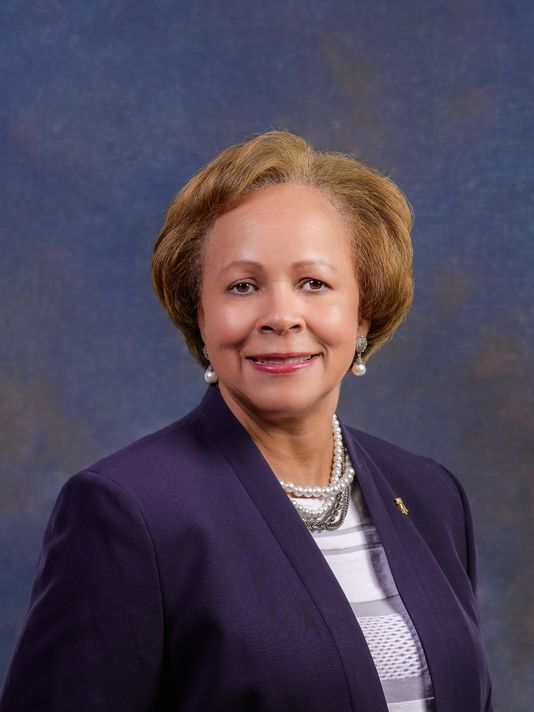It’s been a long journey for Phyllis Worthy Dawkins.
A childhood living in public housing. Attending newly desegregated schools. Navigating higher education. Sexism and racism that never left her no matter how high she climbed.
But this month she finally reached her destination — a small women’s college in Greensboro. And she couldn't be happier.
Dawkins is the new president of Bennett College. She previously served as interim president at the school for almost a year, and before that she was a provost and vice president for Academic Affairs.
"I'm still in a dream about this," Dawkins said. "When you are interim, you aren't counted in the history books. When they say you are the 18th president, you know you are a part of the history of Bennett."
Bennett is a Methodist university that is home to roughly 500 students. It is one of 105 historically black colleges and universities and one of only two women-only HBCUs in the country.
"Once I started working, I grew to appreciate the opportunity that a single-sex college provides to students – to grow their confidence, to grow as leaders, to give them the space and time to be the person they will become," Dawkins said.
Dawkins is a trailblazer for minority women in higher education. According to a study by the American Council on Education, only 30 percent of colleges were led by women in 2016 and only 17 percent were led by minorities. Dawkins is one of a select group that is both.
Growing up
Dawkins grew up in Lee Walker Heights, the oldest public housing neighborhood in Western North Carolina. The neighborhood is located in the South Slope area of downtown Asheville.
“I can remember it being a lot of fun,” said Dawkins' older brother Henry Worthy. “We didn’t have much but we enjoyed all our neighbors. We had an open door policy back then, no one closed their doors. You can go in and out of everyone’s apartment without worrying about anyone stealing anything.”
The Lee Walker Heights public housing neighborhood in the south slope of Downtown Asheville. (Photo: Ari Sen)
Dawkins attended church services and Christian education classes every Sunday at Mount Zion Missionary Baptist Church, downtown on Eagle Street.
"The church became the center, and I think that helped me because it provided a different group other than the people from Lee Walker Heights I already had," Dawkins said. "I had a variety of different groups that helped me see a new vision for my career."
Mount Zion Missionary Baptist Church, downtown on Eagle Street. (Photo: Ari Sen/asen@citizen-times.com)
Dawkins, Worthy and younger brother Stewart were raised by their mother, Pauline, who did domestic work for a rich, white family who lived in Biltmore Forest, the Binghams. Worthy said the Binghams provided financial support to their mother when the family needed it.
"Even though she worked for them, if she needed some more they would just give it to her; it was never a loan or anything," he said. "They were very beneficial to us growing up, I would say."
Dawkins was a member of the first desegregated class at Asheville High School in 1970. Before integrating at Asheville, Dawkins attended the all-black South French Broad High School for her freshman and sophomore years.
At Asheville High, Dawkins was placed in a college preparatory track, while most of her black peers were placed in the vocational track. She said the divide caused her brother Stewart to stage a walk-out when he arrived at the school the next year.
Phyllis Worthy Dawkins, then Phyllis Worthy in her sophomore class photo for the 1969 edition of "The Bear" yearbook at South French Broad High School. South French Broad served as the all-black high school prior to integration the late 1960s and early 1970s. (Photo: Asheville City School Alumni Center/1969 The Bear Yearbook staff)
"Quite often none of the white kids would talk to the black kids in class,” Dawkins said. "Just being in those college preparatory classes and hearing those other students talk about going to college made me want to go to college."
Dawkins said the transition between schools was well-planned and that Asheville High attempted to equalize opportunity for black and white students in a variety of activities. Soon after arriving, Dawkins joined the cheerleading team at Asheville High. It consisted of a roughly even mix of black students from low-income families and white students from higher income families, including then-Mayor Wayne Montgomery's daughters Ann and Jane. Despite the apparent differences, Dawkins described the group as supportive and close.
"We mixed well together," Dawkins said. "I think we really influenced each others lives."
Cheerleaders from Asheville High School, including Phyllis Worthy, now Phyllis Dawkins, and then-mayor's daughters Jane and Ann Montgomery, pose for a photo for the 1970 edition of the "Paw Prints" yearbook. (Photo: Asheville City Schools Alumni Center/1970 Paw Prints Staff)
Overcoming adversity
After Dawkins graduated in 1971, she attended college at Johnson C. Smith University, an HBCU in Charlotte, where she would later come back to work. As a first-generation college student, Dawkins couldn’t turn to her family when she had questions about school. Dawkins said she often sought advice from the Binghams.
"I was just lucky to have them as a resource," Dawkins said. "Because I was a first-generation student I couldn't always go to my mom; there had to be multiple people in my life to solve these problems."
Even when Dawkins had finished her bachelor's degree she still didn't understand the ins and outs of college, including the letter awarding her a full scholarship to pursue a master's degree at the University of Michigan. "My mother read the awards letter to me – I didn't understand what words like 'fellowship' meant and I didn't understand that I had gotten a full ride," Dawkins said. "I think I was almost two weeks late showing up."
On top of the difficulty understanding the paperwork, Dawkins also said she was the victim of racism and sexism, which she had trouble identifying.
"Sometimes you don't realize that you are going through that until you leave the South or you leave your neighborhood or your high school," Dawkins said. "When I went to graduate school, other people would get their opportunities before me so I would have to make sure I wasn't looked over."
Giving back
Even as president at Bennett, Dawkins makes time for students. Part of Dawkins' job is to travel with students, sometimes to faraway places like Cape Town, South Africa, where she traveled to this month. The Cape Town trip comes soon after a trip Dawkins made with students last month to Seoul, South Korea.
"I just knew the women wouldn't get along," Dawkins said. "But they did get along – and when they had differences they came together under the umbrella of sisterhood. I've never seen anything like that happen before."
Leroy Summers, the vice president for business and finance at Bennett, said although Dawkins hasn't been at the school long she accomplished a lot, including implementing mini-semesters, improving review of academic programs, training programs for faculty and online programs.
"I'm looking forward to her because she's a very easy person to work with," Summers said. "I think the board made an excellent choice."
Dawkins has devoted her career to serving students. Before working at Bennett, Dawkins served as a provost and senior vice president for academic affairs at Cheyney University, the country's first HBCU. Dawkins also worked at Dillard University and Johnson C. Smith University. She holds a Ph.D in adapted physical education from Ohio State University, a master's degree in physical education and recreation for the handicapped from the University of Michigan, and a bachelor's degree in physical education from Johnson C. Smith.
“Not having much of anything, she was always earning scholarships no matter where she went, and she went to so many universities," Worthy said.
Dawkins has two adult children, Malia Jennings, an actress, a writer/producer, and an account manager for NCompass International, and Demi Dawkins, a neurosurgery resident at the University of Wisconsin. She is married to Bobby G. Dawkins, who is a retired as a senior polymer and fiber associate in research and development from PBI Performance Products Inc.
Even though she now lives three hours away, Dawkins said she hasn’t forgotten about her old life in Asheville. She attends many class reunions, and her brother Henry Worthy and several of her friends live in the blue trimmed brick apartments in Lee Walker Heights. Worthy said Dawkins serves as an inspiration for children in public housing.
"You know, they all think we’ll grow up to be little gangsters or somethin’ or we don’t look out for one another ...," Worthy said.
"It’ll be good for Lee Walker Heights to have someone, so that these young kids can know they can do it too, if they work hard."
As Bennett’s president, Dawkins hopes to connect with Asheville alumnae to raise funds to help grow the school's enrollment and to fund new opportunities to help young women succeed like she did.
"It was a long journey to this position," Dawkins said. "We are all role models for what women can do if given the opportunity."
Phyllis Worthy, now Phylis Worthy Dawkins, poses in her cheerleader uniform in the 1971 "Paw Prints" yearbook at Asheville High School. (Photo: Asheville City Schools Alumni Center/1971 Paw Prints Yearbook staff)


